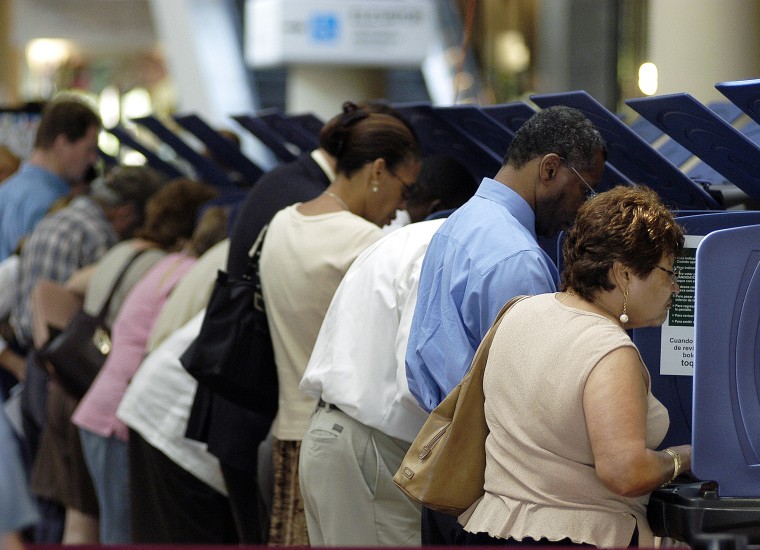More than halfway into his presidency, Pres. Donald Trump enjoys little support among Latinos and a large majority say they're frustrated with the way he treats Hispanics and immigrants, according to a newly released poll commissioned by UnidosUS, a national Latino advocacy group.
The poll, conducted by the polling firm Latino Decisions, found only about one-in-five Latinos (21 percent) said they would probably or definitely vote for Trump, with only 13 percent saying they "definitely" would.
An overwhelming majority —almost eight-in-ten (78 percent)—said they are strongly or somewhat "frustrated with how Trump and his allies treat immigrants and Latinos" and are worried thing will get worse.
Yet on the Democratic side, pollsters did not find overwhelming enthusiasm, with fewer than six-in-ten Latinos saying they were planning to participate in the primaries.
The survey found 76 percent of Hispanics place a priority on a presidential candidate who values diversity and brings people together.
The survey of 1,854 eligible Latino voters, of which 1,506 were registered voters, took place in June — before the massacre in El Paso this past weekend that left 22 people dead and others injured.
The shooter, according to an online manifesto that authorities believe is linked to him, repeatedly spoke of a "Hispanic invasion."
After the shooting, Latino legislators and organizations like the Congressional Hispanic Caucus condemned Trump, who has repeatedly used the word "invasion" in rallies when speaking about migrants, primarily Hispanic, crossing the border into the U.S.
“This vile act of terrorism against Hispanic Americans was inspired by divisive racial and ethnic rhetoric and enabled by weapons of war,” said CHC chairman Joaquín Castro, D-Texas.
UnidosUS, which released results from the poll as part of its yearly conference currently taking place in San Diego, issued a statement about the poll's findings against the backdrop of the El Paso shooting.
“The tragedy in El Paso is a stark reminder that words have consequences. It is not surprising that given this administration’s anti-Latino rhetoric and policies, Hispanic voters want a president that will unify the country,” said Clarissa Martinez-De-Castro, UnidosUS Deputy Vice President of Policy and Advocacy. “Our poll shows that the vast majority of Latino voters are worried that things will get worse for them, and for immigrants, if Trump is re-elected. In addition, this is the first time that we’ve seen gun violence rank among the top five priority issues.”
It is unclear if El Paso's events will have an impact on Latino attitudes towards the President, but the results from the survey suggest Latinos were already having a difficult time supporting the current iteration of the Republican Party.
Among the 37 percent of Latinos who said they had voted for a Republican in the past, 22 percent agreed that it was hard to support Republican candidates. Just 16 percent of those Republican voters agreed that they liked today’s Republican Party.
Of self-identified Republicans, only 50 percent said they were certain they would vote for Trump.
Not a Democratic slam-dunk
Pollsters have been interested in Latino support for Trump since he kicked off his presidential bid by calling Mexicans rapists and criminals. With the debates among Democrats underway to determine who will represent the party against Trump, the poll results show that Latinos want a candidate who both values diversity and is willing to work with the Republicans to get things done.
Matt Barreto, a principal at Latino Decisions, says that those Latinos who agreed that it was difficult to support the GOP also said that they would consider supporting the party in the future if they focused on issues that were important to them.
On the flip side of that coin, Barreto says that while three times the number of Latinos support the Democrats, the party isn't exciting Latinos very much. Among those who identified as Democrats, only 57 percent of them said they were certain to vote in the Democratic primary elections next year.
Perhaps most alarming for Democrats who think the President’s actions against Latinos will be enough to get them to come out and vote, is data from statewide samples in the poll that show widely different levels of enthusiasm among Latinos about participating in their state's primaries.
With samples from Arizona, California, Florida, Nevada and Texas, 50 percent or less of respondents from Florida, Nevada, and Texas said they planned on participating in their state primary election. Latinos from Arizona and California reported the highest interest in participating in the primary election, with 62 percent of respondents from Arizona saying the planned on participating and 60 percent of those from California saying they would do so.
The data showed Hispanics are more willing to vote Republican under certain conditions. When asked if they would consider voting for a Republican candidate who spoke out against the president's harsh policies and worked to create a more humane immigration system, 60 percent said that they would and only 35 percent said that they would not.
Given the last two years, that 35 percent may be of concern to Democrats as organizers on the ground have been asking for more resources to expand on the gains of the 2018 election.
Follow NBC Latino on Facebook, Twitter and Instagram.



